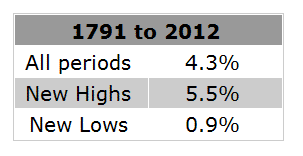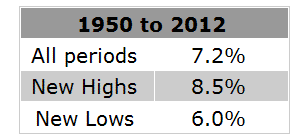Should You Buy Stocks at New Lows? Or New Highs?
InvestorEducation / Learning to Invest Feb 26, 2013 - 11:18 PM GMTBy: DailyWealth
 Dr. Steve Sjuggerud writes: You might not agree with today's lesson... But it's based on numbers going back nearly 100 years.
Dr. Steve Sjuggerud writes: You might not agree with today's lesson... But it's based on numbers going back nearly 100 years.
Last month, I told you even though stocks are way up and hitting levels that have preceded major corrections in the past, it is NOT time to sell.
It might be scary to hang on with stocks near all-time highs. But as I explained, it's the right thing to do today.
And it's been the right thing to do throughout recent history. Let's take a look at the facts...
With our True Wealth Systems databases, we have the best financial data on the planet at our fingertips. We can test just about anything to find ideas that make money.
You see, when stocks hit a new 12-month high, people get scared... They sell. They get worried that the market must be about to fall. On the other hand, when stocks hit a new low, they might figure they're getting them "on sale."
So we tested which strategy works better: Buying near 52-week lows... or buying at 52-week highs. We looked at nearly 100 years of weekly data on the S&P 500 Index, not counting dividends.
You might be surprised at what we found...
After the stock market hits a 52-week high, the compound annual gain over the next year is 9.6%. That is a phenomenal outperformance over the long-term "buy and hold" return, which was 5.6% a year.
On the flip side, buying when the stock market is at or near new lows leads to terrible performance over the next 12 months... Specifically, buying anytime stocks are within 6% of their 52-week lows leads to compound annual gain of 0%. That's correct, no gain at all 12 months later.
Using monthly data, our True Wealth Systems databases go back to 1791. The results are similar... Buying at a 12-month high and holding for 12 months beats the return of buy-and-hold. And buying at a 12-month low and holding for a year does worse than buy-and-hold. Take a look...

The same holds true for a more recent time period, this time starting in 1950...

History's verdict is clear... You're much better off buying at new highs than at new lows.
You might not agree with it... but it's true.
We didn't "cherry pick" in our testing... We looked at 12-month lows and how stocks performed 12 months later. But you'll find similar results when you vary the number of months.
You might think you're getting a deal when you buy with the market at new lows. But it doesn't work.
And you might think buying at new highs "feels risky." But when it comes to the broad market, history shows you're better off buying at new highs than at new lows.
We're not making this stuff up... We're just asking our True Wealth Systems database for the facts... And these are the facts.
You might try to fight this... You might want to "catch a falling knife" and buy when stocks are at new lows. But if you do, realize you are fighting against more than 220 years of historical precedent.
Instead of fighting this... embrace it...
When the market hits a new high, DON'T sell. Enjoy it. New highs mean you're making money. And with history as your guide, you may have more new highs coming.
This idea can keep you from losing money by buying too early, and it can allow you to capture bigger gains by not selling too early. This is the big lesson. Don't forget it...
Good investing,
Steve
The DailyWealth Investment Philosophy: In a nutshell, my investment philosophy is this: Buy things of extraordinary value at a time when nobody else wants them. Then sell when people are willing to pay any price. You see, at DailyWealth, we believe most investors take way too much risk. Our mission is to show you how to avoid risky investments, and how to avoid what the average investor is doing. I believe that you can make a lot of money – and do it safely – by simply doing the opposite of what is most popular.
Customer Service: 1-888-261-2693 – Copyright 2013 Stansberry & Associates Investment Research. All Rights Reserved. Protected by copyright laws of the United States and international treaties. This e-letter may only be used pursuant to the subscription agreement and any reproduction, copying, or redistribution (electronic or otherwise, including on the world wide web), in whole or in part, is strictly prohibited without the express written permission of Stansberry & Associates Investment Research, LLC. 1217 Saint Paul Street, Baltimore MD 21202
Disclaimer: The above is a matter of opinion provided for general information purposes only and is not intended as investment advice. Information and analysis above are derived from sources and utilising methods believed to be reliable, but we cannot accept responsibility for any losses you may incur as a result of this analysis. Individuals should consult with their personal financial advisors.
Daily Wealth Archive
|
© 2005-2022 http://www.MarketOracle.co.uk - The Market Oracle is a FREE Daily Financial Markets Analysis & Forecasting online publication.



